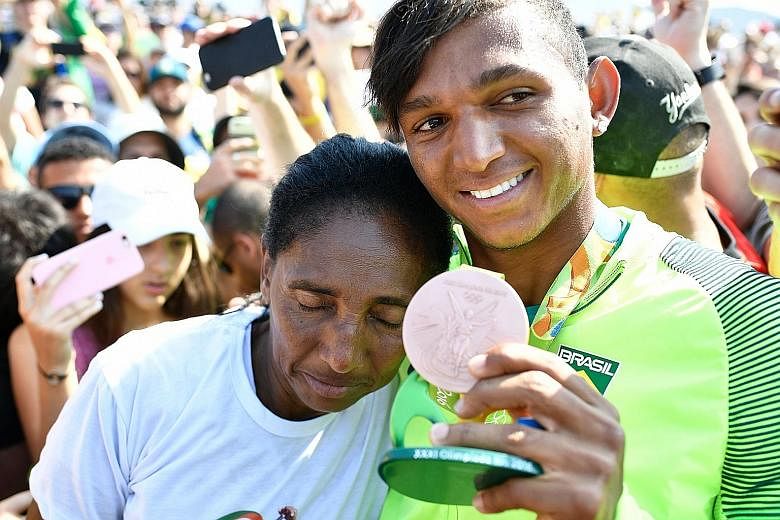RIO DE JANEIRO • When Isaquias Queiroz dos Santos claimed a bronze in the men's canoe single 200m final on Thursday, he became the first Brazilian athlete to win two medals at the Rio Olympics.
Naturally, the 22-year-old was mobbed by the locals on his achievement. But little did many of them realise then that his success is the unlikely punctuation to an early life filled with challenges.
Queiroz, who narrowly lost to Germany's Sebastian Brendel to settle for silver in the canoe single 1,000m on Tuesday, escaped death three times before he turned 10, reported rio2016.com.
At age three, a pot of boiling water fell on him, scalding large sections of his body.
Doctors told his mother to prepare for his death, according to Brazil's O Globo newspaper, but she refused to believe the prognosis, and she was right.
But, while his body healed, life still got harder for him.
At age five, Queiroz, who grew up in poverty-stricken north-eastern Brazil, was kidnapped. He was eventually returned to his mother unharmed but his father would die that year.
Tragedy also struck again five years later. He fell out of a tree and onto a rock while trying to get a better look at a snake hanging from a branch.
After being transferred to a larger town's hospital, doctors found one kidney had nearly split in two. They eventually removed the organ.
That last hardship gave him the nickname he is known by in Brazil, not only in the form of a scar, but in the nickname "Sem Rim", which means "Missing Kidney".
While doctors warned Queiroz to stay away from sports, the resilient kid had other plans. "I never thought if I would have a complicated life because of that," he told SB Nation. "As soon as I could I came back and had a normal life."
His success may have been written in the stars as he was born in the small town of Ubaitaba, which in the indigenous Tupi-Guarani language means "city of canoes".
After his third placing on Thursday, he said: "It really was for me a satisfaction to be able to win this medal after all the obstacles I have faced."
But he was also quick to minimise the impact of this early trauma, arguing that all athletes face challenges, "just like all other professions".
"In short: I had to overcome many obstacles," he said. "But that never affected me and I tried not to let it affect the psychological part."
Queiroz has a chance to win a third medal - and possibly a gold - in Rio today if he reaches the final of the canoe double 1,000m with Erlon de Souza Silva.
The Brazilians are world champions in this event. "I hope that we win the gold," Queiroz said. "I think we have a chance because we're very strong. I hope that Erlon also has a chance of winning a medal. He has a very underprivileged past so he really deserves it for the work that he's put in."
REUTERS

